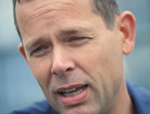How Corporates can Tackle Climate Change: Hivos - Eco Matser
Developed countries produce by far the majority of greenhouse gases, but the impact of climate change is felt most keenly in the world’s developing countries. In agricultural communities that rely on traditional farming methods, for instance, a change in the timing of the rainy season can be the difference between life and death.
Climate change is firmly on the political agenda, and the upcoming COP15 summit in Copenhagen in December will set the global agenda for the years ahead, but many feel that combating climate change cannot be left in the hands of governments.
‘In terms of limiting carbon emissions from developed countries there are at least political plans in place, which is an important first step, but it is far too little and far too slow. There is no real understanding of the urgency,’ says Eco Matser, head of climate, energy and development for development organisation Hivos.
‘Copenhagen will be a critical moment in getting worldwide agreement, but the political process is slow, so individuals and corporates must act too.’
Headquartered in the Netherlands, Hivos is a non-governmental organisation that works with local organisations in developing countries towards a free, fair and sustainable world. It strives to provide people around the world with equal access to resources and opportunities for their development. Crucial to this effort is its involvement with renewable energy projects.
Hivos urges people and businesses in developed nations to consume less energy and switch to cleaner alternatives, and impels governments to adopt sustainable policies. Furthermore, it gives companies and individuals the opportunity to take responsibility through the Hivos Climate Fund, which sells emission allowances to offset residual greenhouse gas emissions.
‘The fund is an important tool to enable us to explain the link between emissions here in developed countries and their impact in developing countries. We are also engaged in renewable energy projects in rural areas, such as encouraging farmers to use biogas as an energy source or micro-hydropower projects for small villages, where even a small stream can produce a lot of energy,’ explains Matser.
Think global, act local
Worldwide, 1.6 billion people do not have access to electricity. Hivos encourages developing countries to make energy accessible to the poor. ‘Most of our efforts are in providing the right social structure and assuring that the type of renewable energy used fits the local economical structures. We also offer micro-finance solutions so that rural areas can get access to the right technology,’ remarks Matser.
Part of Hivos’ strategy, however, is to combat poverty through changes in developed nations. For Matser, this is vital in seizing the opportunity to develop societies that are not reliant on fossil fuels. ‘Unsustainable practices in developed countries leading to climate change decrease the opportunity for people in developing countries to achieve a decent life.’
In the boardroom of a European corporate the plight of farmers in developing countries may seem a million miles away, but Hivos is making a firm link between the activities of companies in developed nations and the effects of climate change on the world’s poorer countries. Furthermore, it is showing corporates how they can act locally to make a big difference globally.
‘For companies there is a simple answer. They can do a lot to reduce their impact on the environment by reducing CO2 emissions and saving energy. We are working with corporates on ways to achieve that and encouraging them to use renewable energy,’ says Matser.
‘Through the Climate Fund we can also compensate them for the emissions they can’t reduce, but the strategy begins with reducing energy consumption and using renewable energy.’

